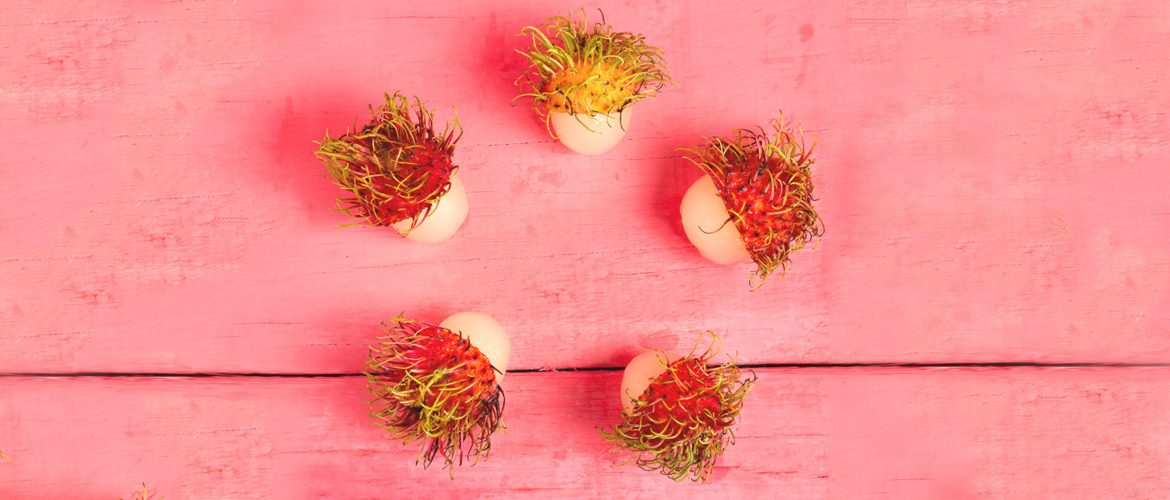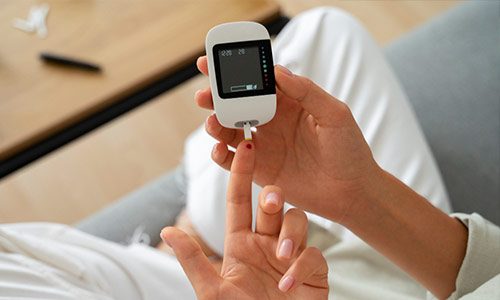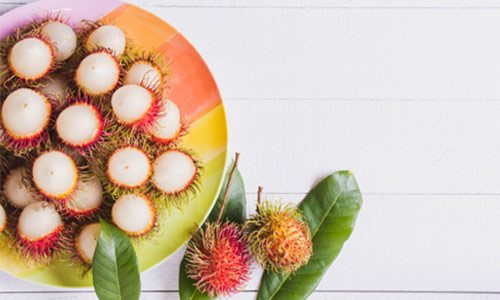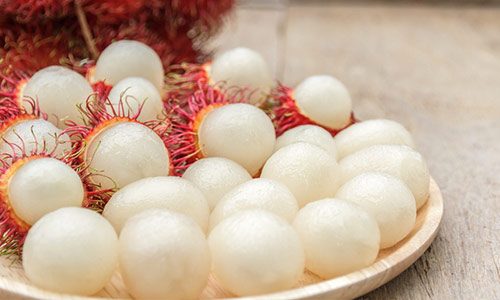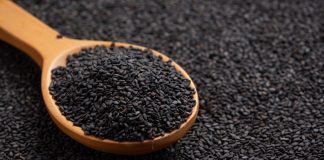Benefits of Rambutan Seeds for Diabetes
Rambutan seeds, rich in nutrients and bioactive compounds, have the potential to be beneficial for diabetes management.
1)Healthy Digestion
Rambutan fruit and seeds are healthy for digestion because of their high fiber content. It also has soluble fiber which is effective for gut bacteria.
2)Manage Blood sugar
Diabetic patients can consume rambutan seeds to maintain their glucose level. You can take these seeds to limit the symptoms of diabetes.
3)Rich in Nutrients
Another benefit of eating rambutan seeds is because of rich in nutrients that are healthy for your body. They contain vitamin C to fight and prevent diabetes and other diseases.
4)Detoxification
Rambutan is good for detoxification. It removes toxins from the body and manages the sugar level. As a result, you have cleansed the blood system.
5)Weight Loss
Rambutan has low calories and has plenty of fiber. This combination keeps you fuller and helps you avoid overeating.
How Many Rambutans Can I Eat a Day?
The number of rambutans you can eat in a day depends on various factors, including your overall diet, individual health conditions, and personal tolerance. Rambutan is a delicious tropical fruit that is rich in nutrients, but it’s important to consume it in moderation. Here are some points to consider:
- Portion Size:
Rambutans are relatively small fruits, and a typical serving size is about 5-10 rambutans. It’s advisable to practice portion control and not exceed a reasonable quantity in one sitting.
- Caloric Intake:
Rambutans are moderately high in natural sugars and calories. Eating too many rambutans in a day can contribute to an excessive caloric intake, which may lead to weight gain or disrupt your overall dietary balance.
Consider the total calories consumed by rambutans and ensure it align with your daily calorie needs.
- Individual Health Conditions:
If you have specific health conditions like diabetes or are on a restricted diet, it’s important to consult with a healthcare professional or a registered dietitian for personalized advice.
People with diabetes should be cautious with their fruit intake, including rambutans, due to their natural sugar content.
- Variety in Diet:
It’s essential to maintain a diverse and balanced diet. While rambutans are a tasty treat, it’s recommended to incorporate a variety of fruits, vegetables, whole grains, proteins, and healthy fats into your daily meals.
- Allergies or Sensitivities:
Some individuals may have allergies or sensitivities to rambutans or other fruits. If you experience any adverse reactions after consuming rambutans, such as itching, swelling, or digestive discomfort, it’s best to avoid them and consult a healthcare professional.
Is Rambutan Good for Diabetes
Rambutan is a tropical fruit that is native to Southeast Asia. It has a round shape with a hairy outer skin that is usually red or yellow when ripe. The flesh of the rambutan is juicy and sweet, similar to lychee, and it contains a single seed in the center.
When it comes to diabetes, it’s important to consider the fruit’s glycemic index (GI) and glycemic load (GL). The glycemic index is a measure of how quickly a food can raise blood sugar levels, while the glycemic load takes into account both the glycemic index and the amount of carbohydrates present in a serving of the food.
The glycemic index of rambutan is relatively low, ranging from 35 to 42. This suggests that fruit has a moderate impact on blood sugar levels compared to foods with a high glycemic index. However, the glycemic load of rambutan is higher due to its carbohydrate content.
While rambutan can be enjoyed by individuals with diabetes, it should still be consumed in moderation and as part of a balanced diet. It’s important to consider portion sizes and monitor blood sugar levels when incorporating any new foods into a diabetic meal plan.
What are the pros and cons of Rambutan Seed?
Rambutan seeds, found inside the sweet and juicy fruit of the rambutan tree (Nephelium lappaceum), are a topic of interest due to their potential benefits and drawbacks. Here is some suitable informational content outlining the pros and cons of rambutan seeds:
Pros :
- Nutritional Value: Rambutan seeds are a good source of nutrients such as protein, healthy fats, and dietary fiber. They also contain vitamins and minerals like calcium, phosphorus, iron, and vitamin C.
- Antioxidant Properties: These seeds contain antioxidants like flavonoids and polyphenols, which can help protect the body from oxidative stress and reduce the risk of chronic diseases.
- Potential Medicinal Use: In some traditional medicine practices, rambutan seeds have been used to treat various ailments, including diarrhea and dysentery. Some studies suggest that compounds in the seeds may have antibacterial and antiparasitic properties.
- Edible When Cooked: While rambutan seeds are not typically consumed raw due to their bitter taste and toxicity, they can be eaten when cooked or roasted. Cooking can neutralize the bitterness and make them safe to eat.
Cons:
- Toxicity: Rambutan seeds contain compounds like saponins and tannins, which can be toxic if consumed in large quantities or eaten raw. These compounds can lead to gastrointestinal discomfort, nausea, and vomiting.
- Bitter Taste: Even after cooking, some rambutan seeds may retain a bitter taste, which can be unpalatable for some individuals.
- Limited Culinary Use: Rambutan seeds are not as commonly used in cooking as other edible seeds like almonds or sunflower seeds. Their limited culinary use may discourage people from incorporating them into their diets.
- Potential Allergic Reactions: Like other nuts and seeds, rambutan seeds have the potential to cause allergic reactions in some individuals. Allergies to rambutan seeds are rare but can be severe in some cases.
- Difficulty in Preparation: Extracting and preparing rambutan seeds can be a time-consuming process. It may not be worth the effort for some people, especially given the bitterness and potential toxicity concerns.
In conclusion, rambutan seeds have both pros and cons. While they offer nutritional benefits and have potential medicinal uses when properly prepared and consumed in moderation, their bitter taste and toxicity require caution. It’s essential to cook them before consumption and be aware of potential allergic reactions or digestive discomfort.
Are There Any Side Effects to Rambutan Seeds?
Rambutan, a tropical fruit native to Southeast Asia, is prized for its juicy, sweet pulp. While the fruit is popular for its taste and nutritional value, its seeds are sometimes consumed or used for various purposes. However, it’s essential to be aware of potential side effects when consuming rambutan seeds.
1. Cyanide Content
The seeds contain compounds called cyanogenic glycosides, which can release small amounts of cyanide when ingested. Cyanide is a toxic substance that can be harmful in excessive amounts.
2. Gastrointestinal Discomfort
Eating rambutan, especially in large quantities, can lead to gastrointestinal discomfort. Some people may experience stomach pain, bloating, or nausea.
3. Allergic Reactions
Allergic reactions are rare but possible. Symptoms of an allergic reaction may include itching, hives, or swelling.
4. Potential for Cyanide Poisoning
Ingesting large quantities, or consuming them without proper preparation, can potentially lead to cyanide poisoning. Symptoms of cyanide poisoning may include dizziness, headache, confusion, and in severe cases, seizures or loss of consciousness.
5. Preparation Matters
To minimize the risk of cyanide exposure, it is essential to properly prepare the rambutan seed before consumption. This typically involves roasting or boiling the seeds to neutralize the cyanogenic glycosides and make them safe to eat.
6. Moderation is Key
Consuming rambutan seeds in moderation and as part of a balanced diet is generally considered safe for most people. However, it’s crucial to exercise caution and not overindulge.
7. Individual Sensitivity
Individual sensitivity may vary because some people may tolerate them well, while others may experience discomfort or adverse reactions.
8. Consultation with a Healthcare Provider
If you have any concerns about consuming rambutan seeds, particularly if you have underlying health conditions or allergies, it’s advisable to consult with a healthcare provider before including them in your diet.
Hope we have now answered your question “Are there any side effects to rambutan seeds?” Read further to know about Who should not use rambutan seeds for diabetes.
Can you Eat Rambutan Seeds?
Yes, rambutan seeds are edible, and some people do consume them. However, it’s important to note that rambutan seeds have a tough outer layer that should be removed before eating. The seed inside is edible and has a nutty flavor when roasted or boiled.
To prepare rambutan seeds for consumption, follow these steps:
- Remove the Outer Layer: Carefully peel away the tough outer layer of the seed. This can be done by making a small incision with a knife and then gently squeezing the seed out.
- Boil or Roast: Once the seeds are extracted, they can be boiled or roasted. Boiling is a common method; simply boil the seeds in water for about 15-20 minutes until they become tender. Roasting in an oven or on a stovetop is an alternative method, giving the seeds a nuttier flavor.
- Seasoning: After boiling or roasting, you can season the seeds with salt or other spices to enhance their taste.
- Enjoy in Moderation: While rambutan seeds are edible, it’s advisable to consume them in moderation. Like many seeds, they contain certain compounds, so excessive consumption may not be suitable for everyone.
Who Should Avoid Using Rambutan Seeds for Diabetes?
Rambutan seeds have gained attention for their potential benefits in managing diabetes, but they may not be suitable for everyone. It’s essential to understand who should exercise caution or avoid using rambutan seeds for diabetes management.
1. Individuals with Allergies
If you have known allergies to rambutan or related fruits, such as lychee, it’s advisable to avoid rambutan seeds. Allergic reactions can range from mild itching and hives to severe anaphylaxis in rare cases.
2. People with Cyanide Sensitivity
Rambutan seeds contain cyanogenic glycosides, which can release small amounts of cyanide when ingested. Individuals with a sensitivity to cyanide or those who have experienced adverse reactions to foods containing cyanogenic glycosides should avoid them completely.
3. Pregnant and Breastfeeding Women
Pregnant and breastfeeding women should be cautious when considering the consumption of rambutan seeds. While there is limited research on the safety of rambutan seeds during pregnancy and breastfeeding, it’s best to consult with a healthcare provider before incorporating them into the diet.
4. Individuals with Gastrointestinal Sensitivity
When consumed in large quantities or without proper preparation, it can cause gastrointestinal discomfort. If you have a history of gastrointestinal sensitivity or conditions like irritable bowel syndrome (IBS), you may want to avoid rambutan seeds or consume them in moderation.
5. People on Specific Medications
If you are taking medications that interact with foods high in cyanogenic glycosides or have specific dietary restrictions due to medical conditions, consult your healthcare provider before adding rambutan seeds to your diet.
6. Those with Kidney Issues
Individuals with kidney problems may need to exercise caution when consuming foods high in potassium, including rambutan seeds. An excessive intake of potassium can be harmful for individuals with impaired kidney function.
7. Young Children
Rambutan may pose a choking hazard for young children. It’s crucial to ensure that seeds are removed or thoroughly crushed before serving to children.
8. Those with Dietary Restrictions
If you are following a specific dietary plan or have dietary restrictions due to health conditions, consider the impact of rambutan seeds on your diet and consult a healthcare professional if necessary.
Conclusion
While rambutan seeds may offer potential benefits for diabetes management, they are not suitable for everyone. If you fall into any of the categories mentioned above or have concerns about incorporating rambutan seeds into your diet, it’s essential to consult with a healthcare provider. They can provide personalized guidance based on your specific health needs and circumstances, helping you make informed decisions about the use of rambutan seeds for diabetes management.









